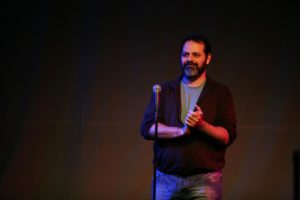FIRST STAND, THEN SPEAK, THEN TELL.
ANYONE CAN do it
An actor for many years, I was no stranger to the stage or the spotlight, but a crippling fear of public speaking, an absence of direction, and a lack of “interesting” things that ever happened to me held me back from pursuing the enviable art of storytelling that greats like Spalding Gray inspired me to want to do. Finally, an ad for something called “The Moth” let me know that ordinary people could participate in true, personal storytelling as well and I was finally inspired to actively overcome my 3 obstacles.
OBSTACLE 1: FEAR OF PUBLIC SPEAKING When I decided that I wanted to give this “storytelling thing” a shot, I knew I was finally going to have to face this major fear of mine. I don’t know where it came from. I know it’s not uncommon, but I used to be able to present confidently in class. Then one summer, at the end of an internship, I presented my summer’s results to my classmates and instructors to an appreciative crowd. I even enjoyed myself. But then, back at school the next semester, it was time to present the same information to my professors and I suddenly had a profound fear of being judged and found wanting.
That was it.
From then on, I couldn’t speak without my mouth turning into the Sahara Desert and shaking all over.
Somehow, at the end of grad school, I managed to squeak my way through my Master’s project presentation and then rarely (though, unfortunately, not “never”) needed to speak live, before an audience again (except in the guise of a character in some play).
Fortunately, I had recently visited a Toastmasters club and knew what it had to offer. I hadn’t joined after my visit because, although I could see the benefit, I hadn’t foreseen the need. Now that I wanted to be a storyteller, I had the need. Working on speeches and delivering them in the “safe space” of a supportive Toastmasters club would get me over my fear of public speaking. My first speech wasn’t that great and I felt even worse about my second one, but I took a chance on altering my preparation technique on the 3rd one and it paid off. I started feeling good about my progress. Then I spoke at an Open House. It was one thing to get comfortable in front of my club-mates, but another to speak before new strangers who were considering joining Toastmasters based on (among other things) how well I delivered my message at the Open House. I survived that, too, and subsequently stretched my public speaking muscle even further. Through activities such as these, I got more and more confident over time. Fear of Public Speaking: (reasonably) conquered.
OBSTACLE 2: HAVING NO DIRECTION If I was going to tell stories, I needed to know how to tell stories. I can say that, at that point in my life, I knew that I could recognize a good story and how story worked. Even at a young age, watching a movie with a childhood friend, someone would say something cryptic or we’d spy someone staring at the movie’s star from behind a plant and my friend would say “what does that mean?” or “who is that?” and I’d say (because, even at a young age, I got it) “we’ll find out later.” He’d ask if I’d seen the movie before and I’d say I hadn’t, I just knew how stories worked. I didn’t know the words for the elements or rhetoric of story, but I knew them when I saw them. Still, how was I going to apply that to starting to tell stories?
Toastmasters was a good start. It gave me a stage to practice by trial and error. Some of my early speeches included tales of getting lost while driving (I actually drove across the Brooklyn Bridge 4 times within 20 minutes, trying to find my way back to Long Island from New York City) and a miserable college Spring Break trip to the Bahamas (at which I lost all my money gambling and spent an inordinate amount of time eating free peanuts in our motel bar, watching the TV where the bartender played “Dirty Dancing,” rewound it, and played it again over and over and over…).
It was a good start. Fortunately, discovering the likes of Doug Lipman (storyteller and coach), listening to The Moth podcast where they sometimes dissected stories, and dipping into the materials which were starting to come via book, video, podcast, workshop, (etc.) at a fantastic rate, all helped me along. I truly feel like I saw the explosion in the popularity of true, personal storytelling happening before my eyes. One moment, there weren’t many materials to look at beyond Aristotle’s Poetics and books on screenwriting, and the next, the word “storytelling” had become a buzz word!
And I ate up as much of it as I could. Having no direction: conquered.
OBSTACLE 3: AN UNINTERESTING LIFE MEANS HAVING NO STORIES So I knew I had a few funny tales (getting lost driving in New York and losing my money on my Spring Break trip to the Bahamas), but that still didn’t amount to much. I would need way more than that if I wanted to entertain crowds!
That’s when I sat down and wrote my autobiography. …not so that anyone would be interested in reading it or anyone would ever publish it, but so that I could jog my memory of my life’s events. I went back as far as I could… my earliest memories… and recalled whatever I could about all the stages of my life. Every grade, every activity, every part-time job, every relationship, every milestone that I could remember, what I liked or hated about them, any trouble I might have gotten in, what I learned, and so on. It was a great exercise, made for a fun stroll down memory lane, and garnered me source material for a variety of stories I would work on in Toastmasters.
I also started carrying around one kind of notebook or another (my favorite is a Moleskine) so (as I tell people) I could “capture my thoughts when I had them so I had them when I needed them.” Whether they were speech ideas or some childhood memory or something that happened in the present time that was worth remembering for later, I wrote it all down and filled a variety of notebooks this way. Admittedly, much of it will never amount to anything, but some of it has and will.
Recently I discovered Matthew Dicks who really could be a one-stop shop for anyone trying to break into storytelling today. His books, his blog, his podcast, his TED talks, his Moth stories, his workshops, and everything he touches are all something from which one can grow as a storyteller. Someone once pointed me at one of his videos and I fell down the rabbit hole and am still down there! Pertinent to the topic at hand, he recommends (and I sometimes follow) a process he calls “Homework For Life” where you take a moment each day to write down a short note about the most story-worthy moments of the day. Another exercise that makes for a fun solitaire game is “First, Last, Best, Worst” which is designed to jar your memory and get you to remember the stories from your life regarding common prompts (like a car… so spend some time thinking about your first car, your last car, your best car, and your worst car…. Anything story-worthy there?). Since coming across his work, I have recommended his readings and teaching to anyone who expresses an interest.
Having done a lot of this work, then, and having listened to many great examples of stories on The Moth podcast and other podcasts, I know that you don’t have to climb Mt. Everest or survive a shark attack to have great stories to tell. It’s possible to make great stories out of somewhat mundane moments… It just requires mining your memory, self-examination, and connecting the dots of your life to make them worth telling.
I still have work to do to generate even more story-worthy stories, but I’m no longer worried about not being able to come up with them because I’ve supposedly led an “uninteresting life”. My 3rd obstacle, conquered.


Professional Services
We offer a variety of professional services that help you achieve your business goals. Do you need help with building a comprehensive business plan to get financing? What about one-on-one mentoring to take your career to the next level? We’ve got that.

Comprehensive Programs
Our dynamic programs cover businesses in a variety of stages and sizes. Whether you’re just starting out, have too many hats as a SME owner, need high-level executive mentoring or need marketing tips that fit your schedule, our programs fit the bill.

Amazing Results
Where do we deliver the most? In our client’s results. We’ve worked with companies from single-person startups to Fortune 500 executives and everything in between. We provide a guarantee that if you follow our plan and don’t see amazing results, you don’t pay.